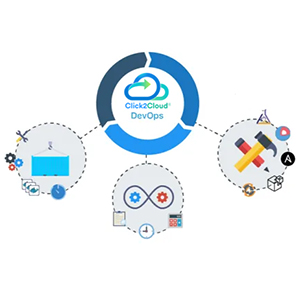
Accelerate Software Delivery with Click2Cloud's DevOps Services
12-Sep, 2023

To meet customer demands in today's fast-paced digital landscape, companies are always striving to deliver high-quality software products and applications. To address these, many businesses are embracing DevOps practices to streamline their development, deployment, and management processes. Click2Cloud's DevOps service offers a comprehensive solution that emphasizes communication, collaboration, integration, and automation between development and IT operations teams. Let's delve into the world of DevOps, its key principles, and how it can transform your software delivery pipeline.
What is DevOps?
DevOps is a fundamental shift in the way organizations approach software development and delivery. It stands for Continuous Development, Continuous Testing, Continuous Integration, Continuous Deployment, and Continuous Monitoring throughout the software development lifecycle. DevOps aims to break down silos between development and operations teams, fostering a culture of collaboration and agility.
The Four Pillars of DevOps
DevOps encompasses four core stages that work together to ensure seamless software delivery:
- Version Control: Version control systems like Git help teams manage and track changes in source code, allowing for collaboration without the risk of conflicts.
- Continuous Integration: Continuous Integration (CI) automates the building, compiling, validating, code review, unit testing, and integration testing of software, ensuring that changes are continuously integrated into the codebase.
- Continuous Delivery: Continuous Delivery (CD) involves deploying the built application to test servers, making it ready for testing, and ensuring that it can be released at any time.
- Continuous Deployment: Continuous Deployment takes automation a step further by deploying the tested application onto production servers for release. It often involves configuration management and containerization to ensure consistency and reliability.
Key Benefits of DevOps
DevOps practices offers numerous benefits to organizations:
- Faster Time-to-Market: DevOps accelerates the development and deployment processes, allowing organizations to bring new features and updates to market more quickly.
- Enhanced Quality: Continuous testing and integration reduce the risk of defects and improve software quality, resulting in a more reliable product.
- Improved Collaboration: DevOps fosters collaboration between development and operations teams, breaking down silos and promoting knowledge sharing.
- Increased Efficiency: Automation of repetitive tasks reduces manual errors and enhances operational efficiency.
- Cost Savings: By optimizing processes and reducing downtime, DevOps can lead to cost savings for organizations.
- Better Customer Satisfaction: Delivering high-quality software promptly leads to increased customer satisfaction and loyalty.
Conclusion:
DevOps, with its emphasis on automation, collaboration, and continuous improvement, is the key to accelerating software delivery while maintaining high quality. Click2Cloud's DevOps services, combined with powerful tools like Jenkins, provide organizations with the means to adapt and excel in the DevOps journey. By embracing these principles and tools, your organization can achieve faster time-to-market, enhanced software quality, and improved customer satisfaction in today's competitive software-driven world. Embrace DevOps and unlock the full potential of your software development process.


